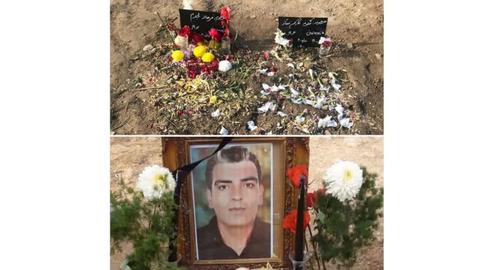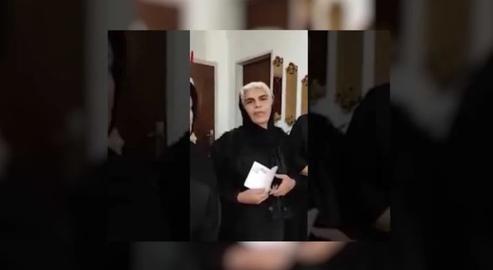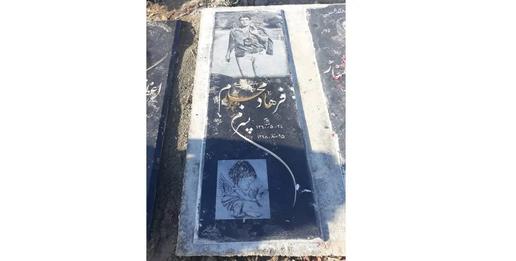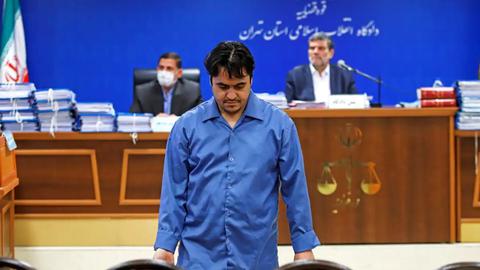"Our children were killed for nothing. As long as I live and breathe, I will try to understand what happened to my son in those final moments."
These are the words of Sedigheh Turani, the mother of Farhad Mojdam. Farhad was killed on November 17, 2019, shot dead by security forces in Malard, Tehran province. A week before the second anniversary of his death, IranWire spoke to his mother about living with the indescribable pain.
***
Farhad Mojdam was just 37 years old when he was shot in the head on the asphalt of Bahareh Gharbi Street, Malard. His body was hidden by officers in a side alley, where it remained for several hours before being transferred to Kahrizak morgue.
Farhad had been happy in the days leading up to November 17, 2019. With the help of his brothers and his mother’s support, he’d managed to set up a mantle shop nearby and stand on his own two feet, after many years of hardship and living in Ukraine for nine years.
That night as crowds stormed through the streets, there was a power outage. After he got home, Farad went back out to bring his sister and husband over so the family could have dinner together. He told his mother to prepare the table. He said he would be back soon.
How did you find out Farhad had been killed?
He left the house that night and said he’d be back in ten minutes. He never came. We searched for three whole days, until someone came to our house to show us a picture of his body on his mobile phone.
That night, when I went out to look for him, I saw blood spilled on the asphalt near the house, in Bahareh Gharbi Street. I asked my heart, which poor young man’s blood is this? Poor mother's heart. I didn’t know it was my son's blood.
A passer-by who was there [at the time of the killing] told us that when Farhad was shot, the officers put his body in a car and took it to the back alley. He was in the alley for three hours; people were trying to get someone to come and take the body. Finally an ambulance arrived and took him away.
Did you complain?
No, we didn’t complain. We didn’t really know where to complain, or who was in charge of the process.
Why did Farhad return from abroad after living outside Iran for so long?
After almost a decade, he returned to Iran because he missed his family. He stayed one year, but he couldn’t bear living here so he decided to leave again. He went to Turkey and from there, to Germany. He stayed for eight months. He knocked on every door, but he couldn’t get residence and was forced to return to Iran. We have been living all together for the last two years. My husband died two years ago. I insisted that Farhad get married and start a family. But he said a woman wants good amenities and conditions.
That night, I wanted to set the dinner table. He said, "Wait a few minutes, let me go and get my sister from across the street, let's have dinner together." He went off to get his sister. My daughter and son-in-law returned. But Farhad did not.
For three days, no one called you with information?
No. I went out into the street several times and came back. There were signs of the clashes everywhere. My son-in-law and I went to all the hospitals; but they said they hadn’t admitted such a person there.
I later heard from other bereaved mothers that none of them could get a response that night. Why not? Maybe they thought they should let the situation calm down.
For three days, our follow-ups were fruitless. Whenever someone knocked on the door we’d say that it was Farhad returning home. When a witness came and showed his picture, the world collapsed on my head. They told us to go and collect his body from Kahrizak.
That witness didn’t talk about how Farhad was killed?
They told us a girl had been injured. Farhad had gone to help her, shouting over her head, "You killed her. You killed her.” He was shot right there. His body was taken and placed in front of a butcher’s shop not far from our house. Later, the butcher told us Farhad had been kept in a car here since eight o'clock at night, and that they had come and taken him away at ten o'clock. That point was not far from our house.
Did they confront you during this period?
Yes. Much. Manouchehr Bakhtiari had invited us to go to Isfahan. There, the agents swarmed into the cemetery, took us away with them, and kept us overnight. In the morning, after getting a commitment from us and taking a photo, they released us.
Later, during the protests against water shortages in Khuzestan, we gathered with the plaintiff mothers in Azadi Square. Again, they took us and transferred us to the detention center and several different office buildings, and finally released us in the morning. The man in charge – I don’t know who he was – came and said: "We know you’re right, you’re heartbroken, but the deaths of your children were not the work of the agents of the Islamic Republic. They were the work of the protesters.” He said the protesters had guns and had attacked people on purpose. They said they were ‘following up’ [on my son’s case] and they would inform us of the result. Then let us go.”
Later, they sent another person to our house. He also insisted they were ‘following up’. He said they hadn’t been allowed to shoot, and hadn’t killed anyone. I said if it wasn’t you that did the killing, why haven’t you caught the killers? You can pull someone out of the ground whenever you want to. Now all these people are dead and you haven’t found one culprit, in all these cities?
How did you cope with this suffering for two years?
I can’t cope. For a long time, my only vocation was to go to the tomb and sit there for long hours. I didn’t want to go home at all.
Do you have any plans for the second anniversary?
Like other mothers, I want to celebrate my son's birthday. Light a candle. I will revive his memory. They hold glorious ceremonies for their dead, but don’t allow us hold ceremonies for our children, who went out empty-handed into the street and were just spectators, with no enmity with this country, and were killed.
Did they request money to hand over your son’s body?
No, they did not request money from us. But they tortured me so much. They made us sign many commitments, told us we had no right to make the slightest move. From morning to afternoon, my other son chased them; he was harassed and insulted right up until the moment he could collect his brother's body. Then he was told to lower his voice, or he couldn’t have it. We were made to go quietly and calmly to collect the body of our beloved one.
One or two videos have been released of mothers in which they say that you and the others want to sue.
I want to know why they ordered the shooting that night. Who ordered it? How did they not identify any culprits? Those same three days that we were unaware and looking for Farhad, I went to a hardware store on our street that had several CCTV cameras installed outside, and asked them to give us the videos so we could watch them. I thought we might find a sign of my son. It was my hope that now my child was lost, at least I might know what his last moments were like.
But the hardware store said their camera was broken the previous night. When we pressed them, they said that people had come from the IRGC, and disassembled the cameras and taken them with them. If it was thugs [who did the shooting], why did they take the footage away?
The hardware store’s next-door neighbor, who must have seen Farhad being shot, wouldn’t say anything. He must be scared. But I say that as long as I live and breathe, I will try to understand what happened to my son in those final moments.
They killed our children for nothing. Death is the destiny of all people, but death of a young child is very painful for a mother.
'Courts Blamed My 15-Year-Old Son for Being Shot Dead in November 2019'
Mother of Slain Protester: I Want Justice For My Son
IranWire Investigation: Shiraz Protests – Agents Shot and Killed Demonstrators
Shiraz Protests: People Threw Stones. Officers Killed Them
Mother of Slain Protester: I Want Justice For My Son
Eighteen Months On, Not One Official Accepts Responsibility for November 2019
Tanks and Machine Guns Used to Subdue People of Mahshahr
Iranian Doctors: The Protesters' Heads and Hearts Were Targeted by the Police
IranWire Pays Tribute to the Protesters Who Lost Their Lives
visit the accountability section
In this section of Iran Wire, you can contact the officials and launch your campaign for various problems



























comments